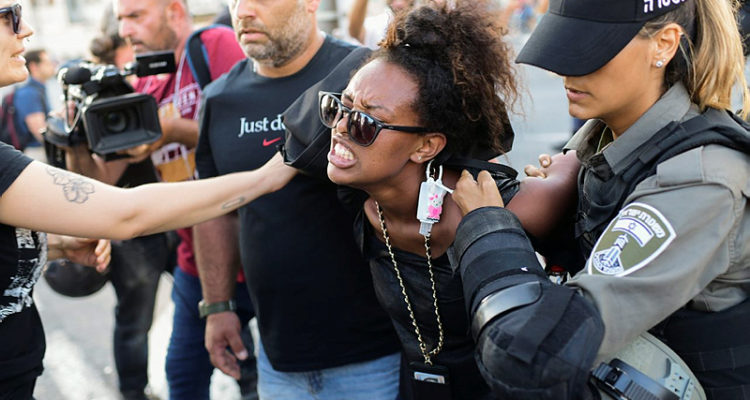Ethiopian protests were largely nonviolent on Wednesday as police responded in greater numbers and the family of the shooting victim called for calm.
By World Israel News Staff
Protests over the shooting death of an Ethiopian youth by an off-duty police officer earlier in the week were calmer on Wednesday. Israeli police, who came out in force, appeared to be largely successful in preventing a repeat of Tuesday’s violence.
The police received help from the parents of Solomon Teka, the 18-year-old victim who was killed on Sunday. They called for the protesters to dial down the intensity and hold off on protests until after shiva, the initial seven days of mourning according to Jewish tradition.
However, the police also acted with greater speed and determination at protesters’ attempts to block roads. At the Azrieli junction in Tel Aviv, hundreds of protesters rushed onto the street at the appointed hour to stop traffic. The police removed them quickly. Road-blocking attempts were tried in other places, also without much success. Several arrests were made.
“We expected tougher incidents,” a policeman told Yediot Ahronot. “I can understand the cry of the protesters but Israel is a state of law and our job is to uphold it.”
According to the paper, Ethiopian Jewish activists posted on social media that they didn’t plan on continuing with violent protests and told members of the community to remain in their homes. “We decided we should stop the violence and now is the time to speak,” one activist told the paper.
Ethiopian protests are different from others in Israel, Yediot reported. Typically, organizers call for a gathering in the a city square and request the necessary permits. Ethiopians simply come out to the streets, answering calls put out on social media.
“It really resembles the ‘Arab Spring’ revolution. You don’t need posters and flyers — it’s enough to run posts, and people arrive in the masses,” one Ethiopian activist said.
Ethiopian Jews in Israel are ripe for calls to protest. They harbor resentment over alleged discrimination in general and specifically by the police. Since 1997, 11 members of the Ethiopian community have been killed in various circumstances by Israel’s police force.
In the latest shooting, the policeman said he acted in self-defense and felt in imminent danger. He said he shot at the ground in warning and the bullet ricocheted and struck Teka in the chest. However, others dispute this version of events.
The police promise to investigate the incident thoroughly.





